The Art Of Running A Shotgun

Properly running a shotgun isn’t as easy as it should be, but here we give you some tips on aiming, shooting and reloading scatterguns.
I’m switching shotguns. I’ve used a variety of Remington 1100s for something like 4 decades now, but time overcomes everything. They’re elderly; keeping them running is work, and there are better options.
The one I’ve selected is the Mossberg 940 JM Pro. Built by Mossberg for competition and defense, the 940 in the JM Pro model is advanced to being a top-tier competition shotgun, with input from my friend Jerry Miculek. He saw to the enlarging of some of the controls, the opening-up of the loading port and a stock that can be rebuilt to fit you.
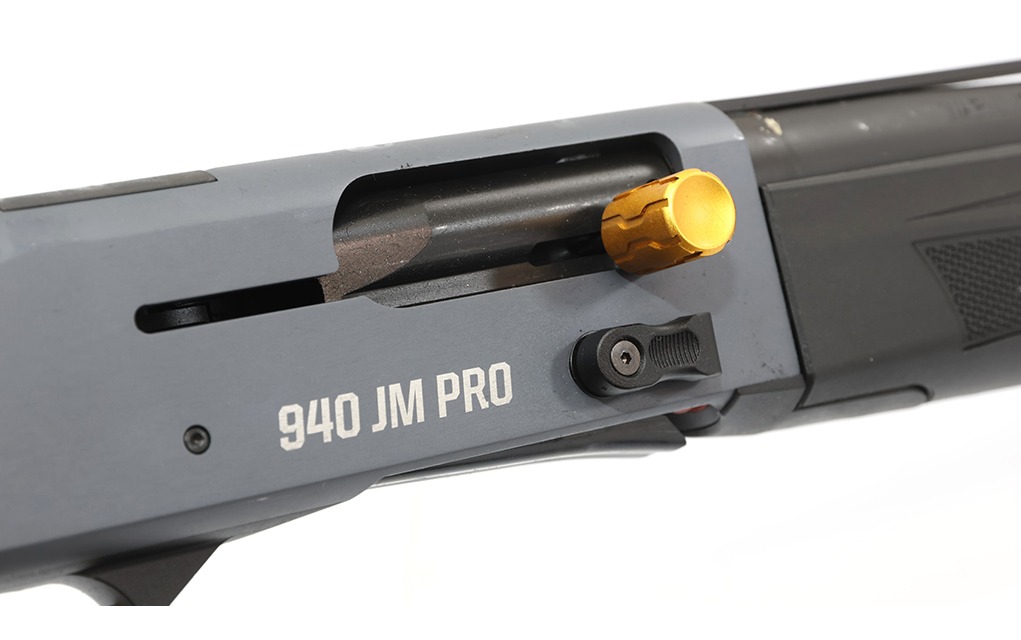
Oh, and there’s a base machined into the receiver for direct-mounting of a red-dot optic. Its soft-recoiling gas system that adjusts for a wide variety of loads, which is a big help as well. Who wants a picky shotgun?
How Can You Miss With a Shotgun?
In introducing new or relatively new shooters to using shotguns in 3-gun, multi-gun and bowling pin competition, I always run into the same question: “How can you miss?” And after a bit of practice, the next question is: “How can you reload faster?”
The urban myth (or tactical myth, whatever) is that shotguns only need to be pointed, and the spread of shot, like a veritable cloud of pellets, will do the rest. Nicknames? “Alley sweeper,” “trench hose” or “scattergun.” And one I heard just the other day, “scattergun chainsaw.” (I’m still shaking my head over that last one. I’m almost afraid to ask.)
This pointing idea comes from the British use of shotguns, where a ridiculously rich and titled landed-gentry hunter would have a shotgun “bespoke,” that is, fitted to him as if it were a suit. Such a fit and proper training means they simply have to mount the shotgun and look at the target, and they hit it. Of course, the “scoring” system is to hit a flying bird at 30 yards or so with an ounce of shot. Out there, the pattern is just under or just over 3 feet in diameter.
Our task is much more difficult. For a 3-gun or multi-gun competitor, the target is a pepper popper, and it requires being struck by more than just the dozen-or-so pellets that will do in a grouse or pheasant. A bowling pin, at 25 feet, is even smaller. You have an area of maybe the size of a pair of playing cards, and you have to put enough pellets on it to drive it off of the table. You have to aim.
And, in a defensive scenario, aiming is even more important due to the simple fact that every pellet you launch has a lawyer attached to it.
This means getting your face down, hard and tight, onto the cheekpiece of the shotgun. A sloppy fit means your pattern will go high of your intended point of impact. In the 940 JM Pro, the stock can be adjusted so it fits you as much as the various swappable parts permit. Nothing works for everyone, so I suppose there are going to be shooters out there who even the JM Pro can’t fit, but not many.
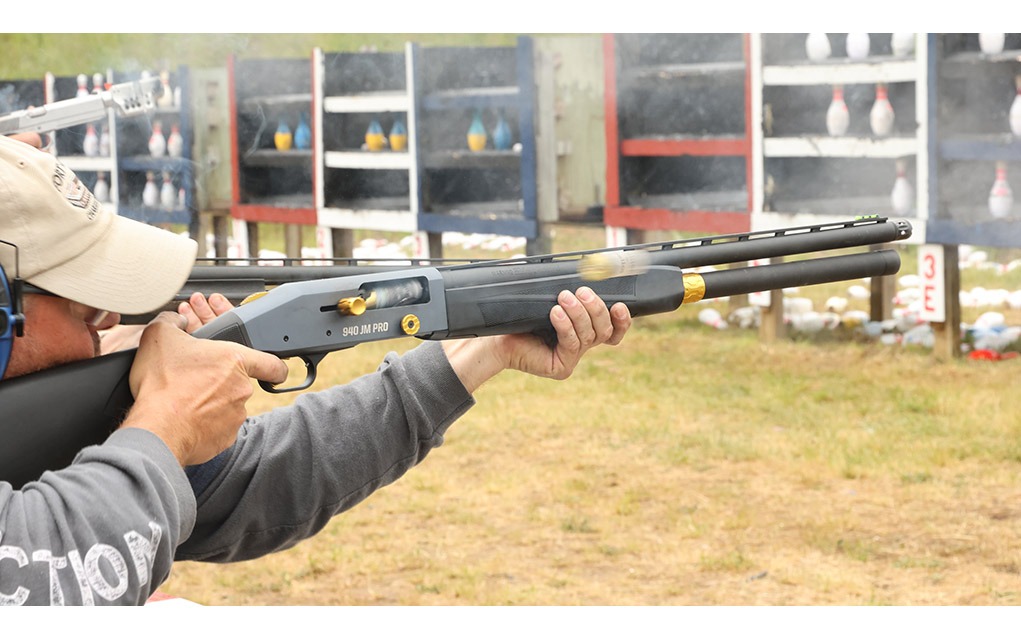

Managing the Push
And then you have to control recoil.
The traditional way to control recoil was to not let the shotgun get a running start. That is, to press the shotgun into your shoulder using both hands as firmly as was humanly possible. Oh, and not out on the shoulder joint, by the way. High and inside, up and more to the centerline, almost onto your collarbone. Since the shotgun doesn’t get a running start, it can only push you—not punch you.
I learned this a long time ago as a skinny teenager, learning to shoot centerfire rifles: the M1 Garand in particular. You aren’t really decreasing felt recoil; you’re simply controlling it in a manageable way that doesn’t beat you up.
The other way is called the “push-pull” method. Here, your firing hand pulls the shotgun back, just enough to be snug against your shoulder and so it doesn’t move around during recoil. Your other hand pushes the forearm away from you. The idea is for the moment before and during firing a shot, you’re doing your best to shove the forearm off of the receiver.
Both of these are work. But they both need to be selectively applied. You don’t tighten up at the beep and stay that tight all through a stage. Mount, aim, lock up, fire, repeat, unlock, move to the next target or array, and repeat. Well, in bowling pin shooting you do stay locked up, but that’s for all of 4 or 5 seconds. Just before the beep, use whatever method you have selected, lift, hose 8 pins, and relax.
Which is better? I wish I could tell you from personal experience. Alas, I have spent so many years (since the middle of the Carter administration) doing the older method, both hands crush in, that every time I try to use the push-pull method I somehow screw it up. Those who start with it report that it works well, and they don’t suffer from recoil.
Good for them. Me? I’m stuck with the old method, and it seems to work well for me, too.
Feeding the Pellet Pusher
Then, there’s the matter of reloading, and shotguns don’t hold much ammo.
The shooting part is very quick, and how to shoot fast, sliding from one target to the next, is an entirely different article. For 3-gun and multi-gun, the way to win stages—and matches—is to be faster on the reloads than the others. Here we have competing imperatives on how to reload: tactical, classic competition and multi-gun competition.
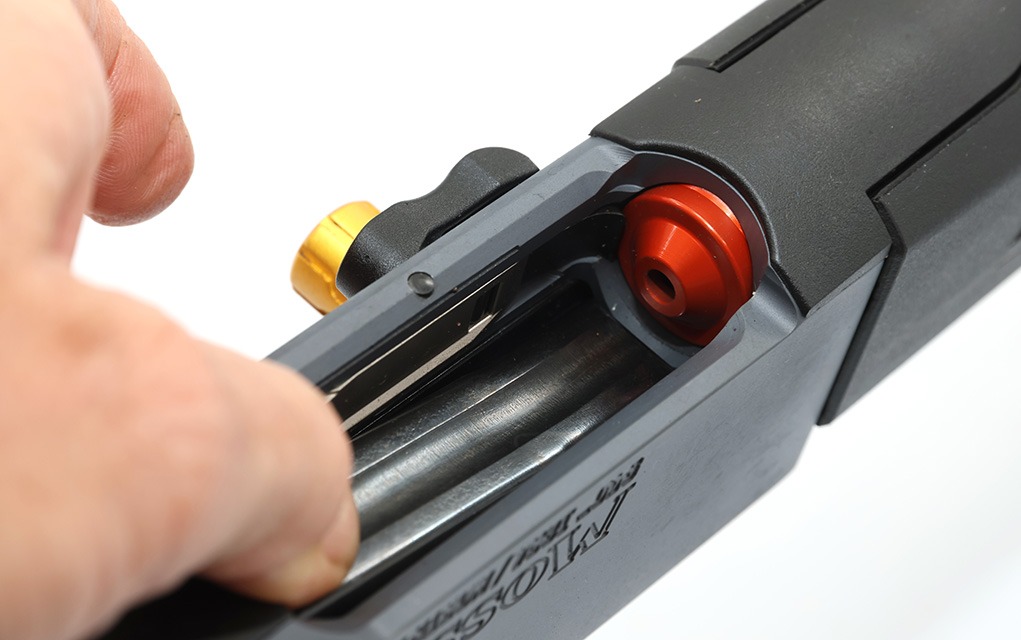

We’re aided in all three by the enlarged loading port of the 940 JM Pro, and its lack of sharp edges. The tactical method is one I never liked, never practiced much, and I don’t like the downsides of. That one is simple: When you need to reload, you leave the shotgun mounted on your shoulder. You reach down with your off-hand (yes, you have to let go of the shotgun) and snatch another shell from wherever you’ve got them stashed. Then, lift up and stuff the shell into the loading port. The downsides? You can’t see the port. You’re holding a heavy shotgun with one hand, and it can easily be snatched away. The advantage: It stays pointed at the bad guy or guys, or their direction.
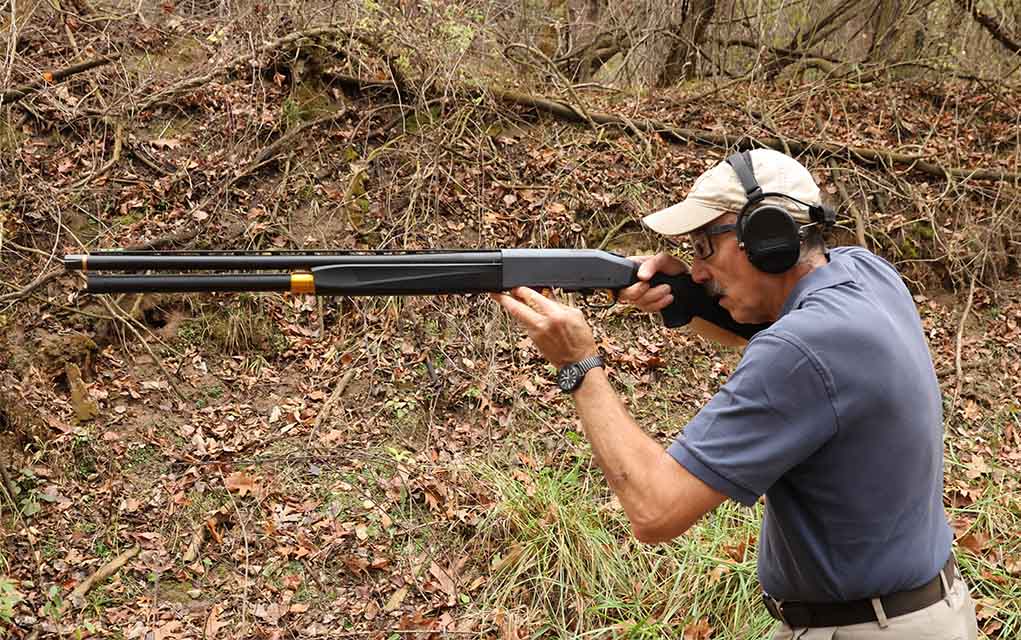

The classic competition reloading works like this: Bring the shotgun down from your shoulder and roll it over so it’s loading port-side up. Shove the stock back and clamp your elbow down to fix the stock between your arm and your side. You can hold it either with your off-hand and load with your strong hand, or keep your strong hand on the stock, and load with your weak hand.
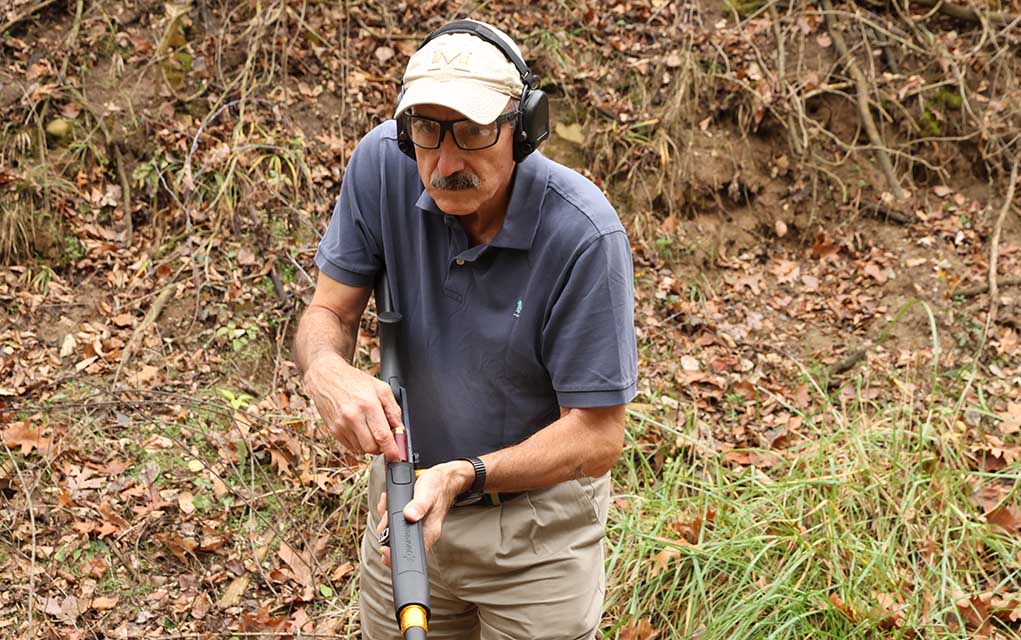

The advantages? You have a more-secure hold on the shotgun. It’s port-side up, so you can see, even with peripheral vision, to load. You can even load by feel, the shotgun is close to you. And the muzzle is still, more or less, at the bad guys, while still in a safe direction. The downside? You have to rotate the shotgun, and if you hold it with your off-hand, you’ll be holding a hot barrel.
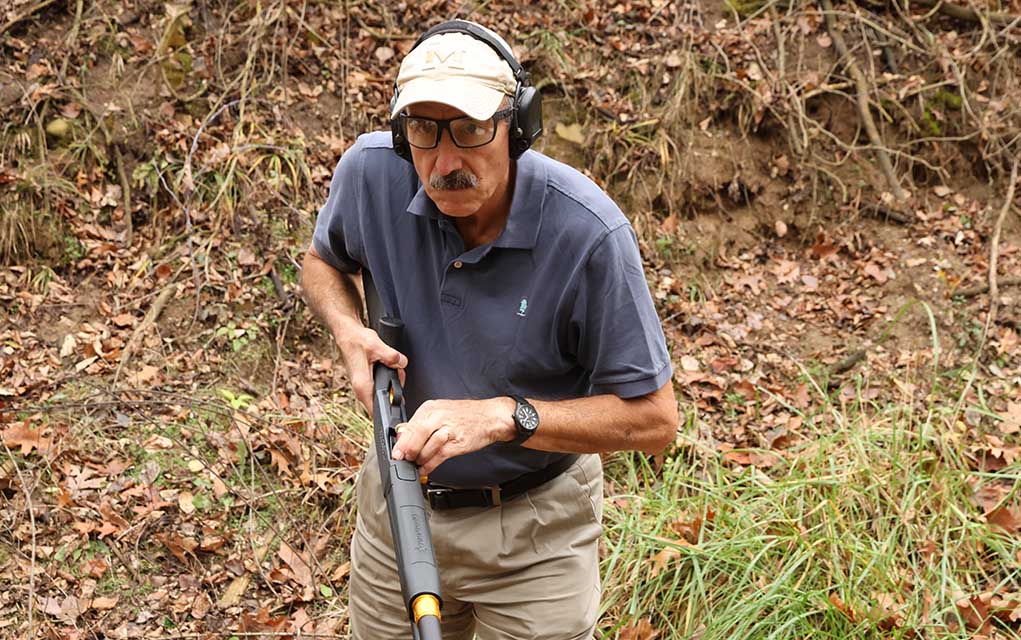

The multi-gun method changes everything. Well, except for your off-hand being on a hot barrel. Here, when it comes time to reload, you rotate the shotgun port-side up again. But, instead of tucking the stock between your elbow and your side, you lift it up and put it aside your head, with the buttplate high enough up to easily reach the loading port. The shells are held in what’s called a caddy, stacked two vertically in the rack, or caddy. An example would be the double Alpha Academy Quad Loader.
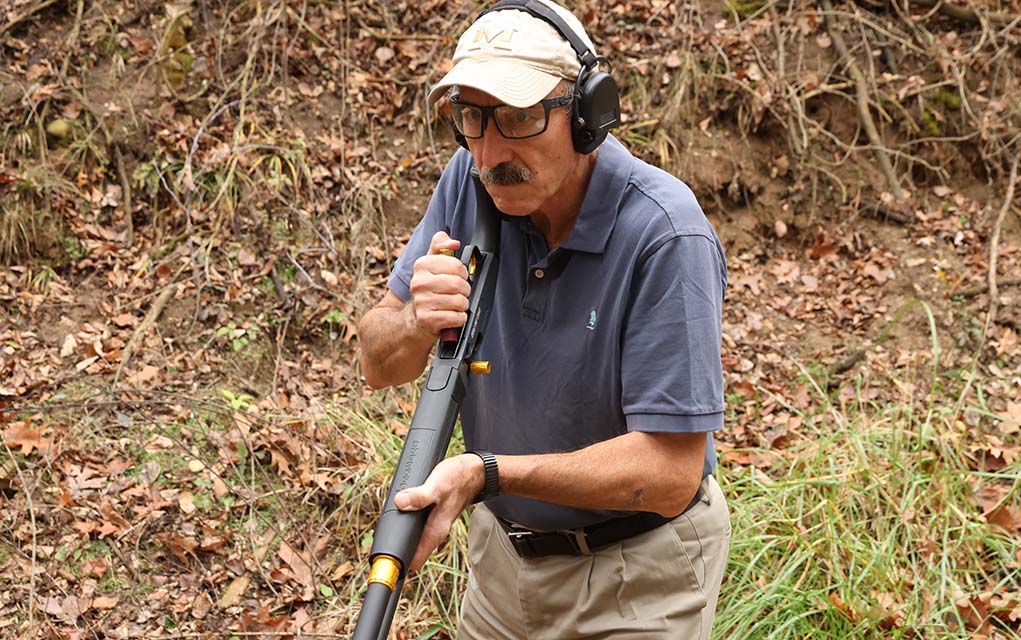

The loading process is also different. Here, you grab two shells with each reach. (The loader holds them that way.) You have your thumb against the primer of the second one, and the nose of the first one protrudes out of your fist.
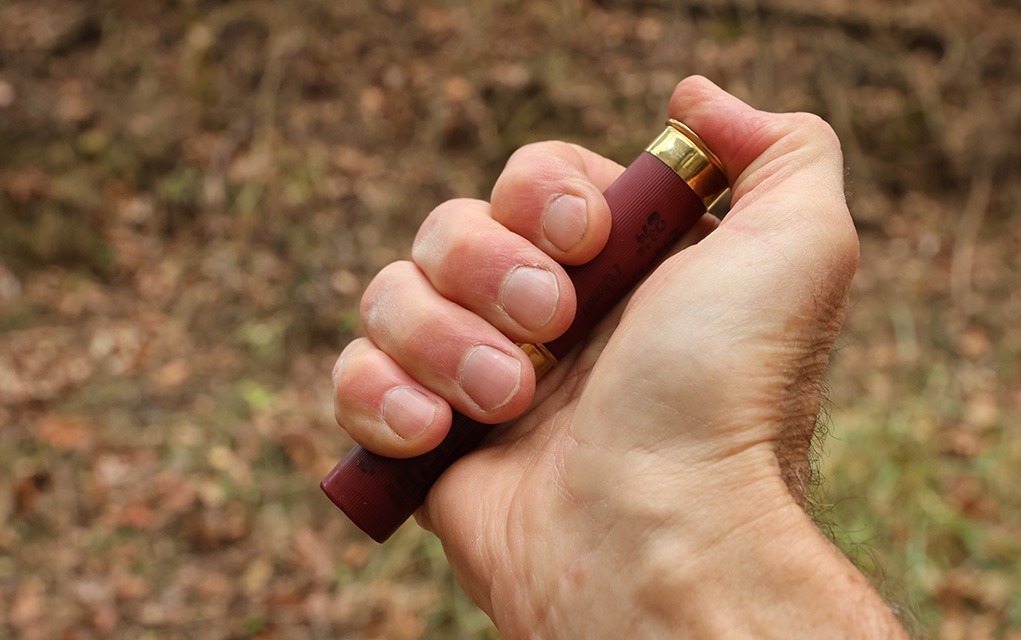

Reach up, shove the nose of the lead shell into the loading port, and against the follower, and then shove and thumb. As your fingers come in contact with the receiver, slide them out of the way, and finish with a thumb-push. Two shells in, in a second or so. Repeat two shells at a time until you are back up to capacity.
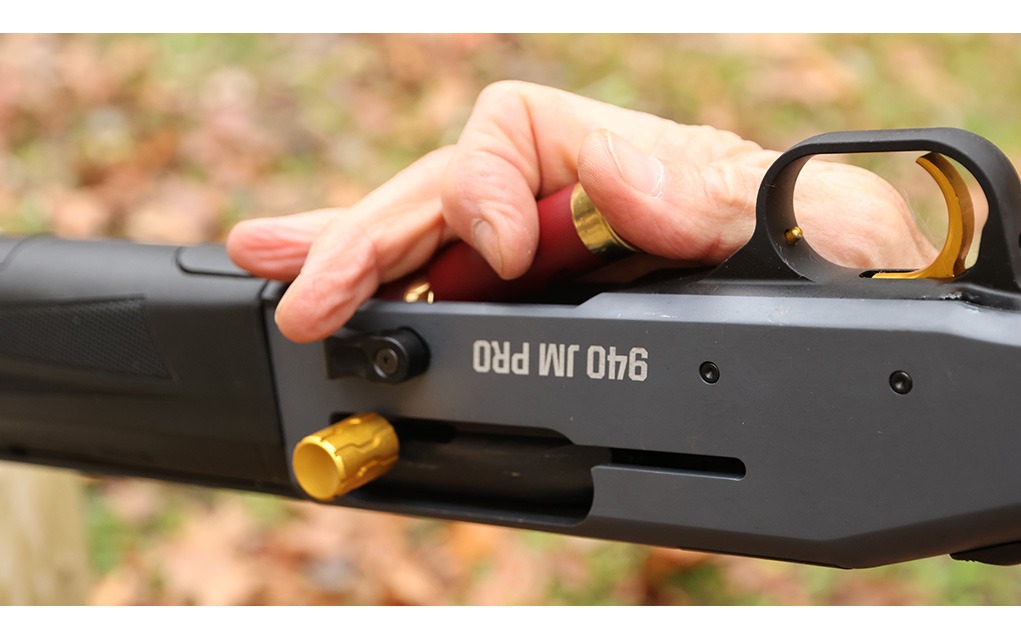

This is the fastest way to reload a shotgun, short of the really specialized tube-loaders. The disadvantages are simple: You need the caddy to load this way. And, your shotgun is muzzle-down while you do this. If you’re dexterous enough, you can forego the off-hand on the hot barrel and maintain your grip on the forearm. That’s a matter of practice and testing. Some can, some can’t.
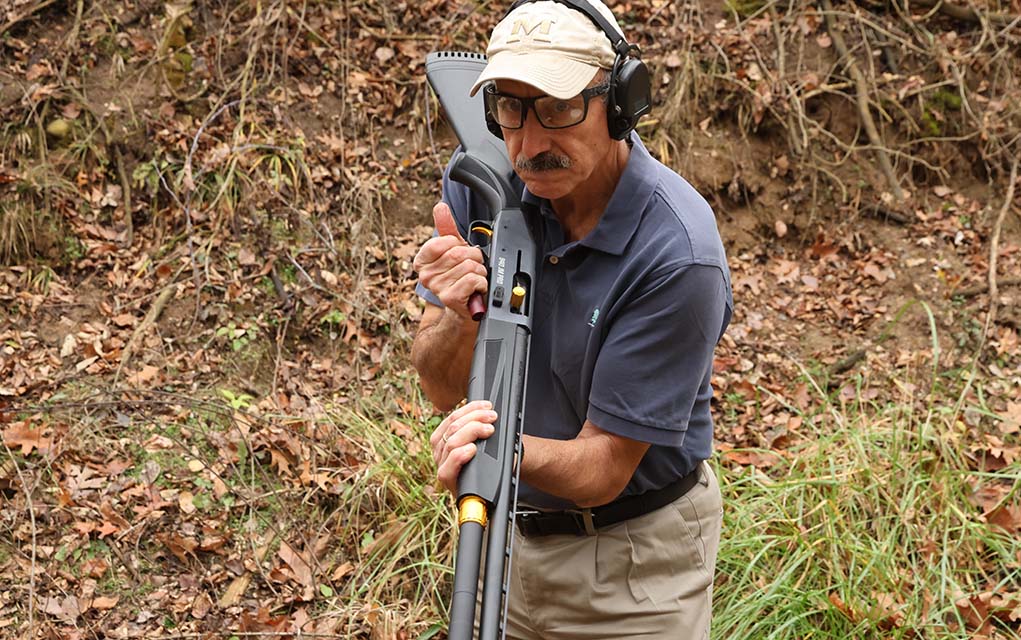

If you’re reloading from belt loops, a sidesaddle (never liked those, but some nearly worship them), a pocket or a carry bag, the multi-gun approach is not going to work. The time it takes fussing over getting two loose or looped shells into your hand in just the right way to two-load them is time better spent getting them in there individually and quickly.
All of these points are the same regardless of what kind of sighting system you use. Well, the bead sights are more susceptible to slow shooting and misses by not having your head down tight on the cheekpiece, but even ghost rings and red-dot optics won’t be happy if your face wanders when you mount the stock.
Conclusion
Once you learn how to run a shotgun effectively, it’s a wicked-good tool for competition or defense. But it won’t come easily—the sheer physics of launching a 1-ounce payload to supersonic velocities exacts a toll. And the payload package cannot be downsized or conveniently stored ready for us. That’s life.
Editor’s Note: This article originally appeared in the January 2025 issue of Gun Digest the Magazine.
More On Shotguns:
Read the full article here



![Best 10mm 1911 Pistols [Field Tested] Best 10mm 1911 Pistols [Field Tested]](https://i3.wp.com/gundigest.com/wp-content/uploads/10mm-1911-feature-colt-delta-elite.jpg?w=390&resize=390,220&ssl=1)



